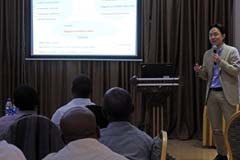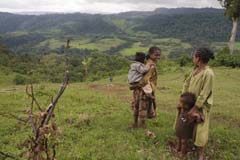Comprehensive accounting of forest values is essential to protect forests: presentation by Research Fellow Narita in Ethiopia
2016.05.11
REDD+ (Reduction of Emission from Deforestation and Forest Degradation+) is a mechanism through which the international community provides economic incentives for activities engaged in by developing countries to protect their forests. It aims to reduce emissions by preventing deforestation and forest degradation (REDD), combined with efforts to preserve forests, achieve sustainable forest management, and increase the volume of carbon stored by forests.
On March 22, 2016 a workshop on REDD+ implementation and participatory forest management took place in Addis Ababa in Ethiopia, and Daiju Narita from the JICA Research Institute (who was a research fellow then but is now a visiting scholar) presented the results of his research: Toward A Comprehensive Accounting of Forest Values in Ethiopia. After making his presentation, he had a discussion with local organizations and aid workers.

JICA-RI Research Fellow Narita gives a presentation
The title of the workshop was "Consultative Workshop on Advancing REDD Plus through Participatory Forest Management in the Oromia Region - How to Reward Grassroots Initiatives against Climate Change," and it was organized by the JICA's Global Environment Department and the Oromia REDD+ Coordination Unit of the Oromia Forest and Wildlife Enterprise in Oromia region in Ethiopia. In addition to people from the host organizations, the World Bank, the German Corporation for International Cooperation (GIZ) and NGOs, such as World Vision and Farm Africa also took part. They discussed issues concerning the future implementation of REDD+-related initiatives.
JICA implemented a participatory forest management project in Belete-Gera in the Oromia region (Phase 1: October 2003 - September 2006, Phase 2: October 2006 - March 2012). At present, JICA is implementing a project to make forests add value by promoting the production and sale of coffee (July 2014 - January 2020), and is planning the incorporation of REDD+ elements in the project activities. Ethiopia's forests apparently used to cover 40% of the country's land, but that figure has now dropped to less than 10%. In addition, deforestation is regarded as being responsible for almost 40% of domestic greenhouse-gas emissions, and the Ethiopian government has a strong interest in this issue. When considering appropriate ways of tackling it, it is important to objectively and comprehensively assess the diverse functions and values of forests.
Narita explained that the objective of his research was to perform a comprehensive assessment of the economic value of Ethiopia's forests by using a consistent methodological framework with that of GDP and the SEEA (System of Environmental-Economic Accounts) approach developed by the United Nations. He said the results obtained would be useful for verifying the effectiveness of JICA forestry projects and could also contribute to the debate on REDD+.

Woodland in Belete-Gera
(Photo: Atsushi Shibuya/JICA)
Narita pointed out that "Many investments in natural capital are not captured in GDP statistics, and even if they are, the estimates are imperfect. In particular, resource depletion and depreciation are ignored." He said one of the distinguishing features of this study apart from previous research is that it refers to the latest theoretical literature from the field of green accounting to make a clear contrast between the benefits delivered by forests and the loss of value that results from deforestation. He also explained that other differences between the study and previous research were that not only the value of natural forests but also the value of man-made forests resulting from afforestation and reforestation was assessed based on recent data. Further, it integrated literature review on qualitative research concerning the cultural value of Ethiopia's forests, and that it discussed the issue using the same conceptual framework as that employed for quantitative assessments.
Narita also had this to say: "Even now, wood and charcoal account for 80% of household fuel, while around 4% of GDP originates from forest-related products such as coffee, honey and lumber. Forests play an extremely important role in people's lives, so the REDD+ perspective is vital. Forests also have significant religious and symbolic value. In the future, I want to investigate the cultural value of forests in individual regions of the country by surveying the literature and also assess its economic aspects."

事業事前評価表(地球規模課題対応国際科学技術協力(SATREPS)).国際協力機構 地球環境部 . 防災第一チーム. 1.案件名.国 名: フィリピン共和国.

事業事前評価表(地球規模課題対応国際科学技術協力(SATREPS)).国際協力機構 地球環境部 . 防災第一チーム. 1.案件名.国 名: フィリピン共和国.

事業事前評価表(地球規模課題対応国際科学技術協力(SATREPS)).国際協力機構 地球環境部 . 防災第一チーム. 1.案件名.国 名: フィリピン共和国.

事業事前評価表(地球規模課題対応国際科学技術協力(SATREPS)).国際協力機構 地球環境部 . 防災第一チーム. 1.案件名.国 名: フィリピン共和国.

事業事前評価表(地球規模課題対応国際科学技術協力(SATREPS)).国際協力機構 地球環境部 . 防災第一チーム. 1.案件名.国 名: フィリピン共和国.
scroll